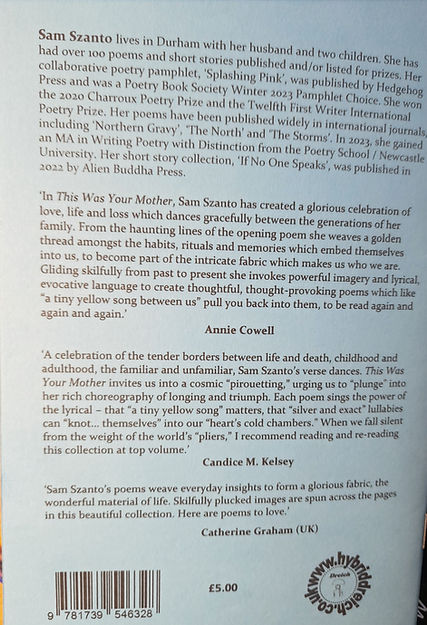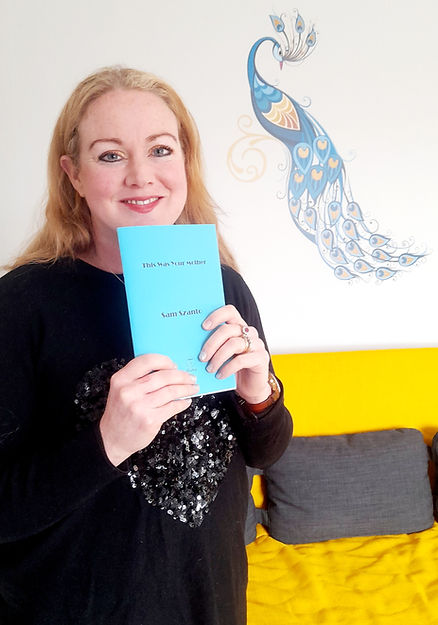20 Questions with... Austin Shirey
- samszanto2
- Mar 28, 2023
- 7 min read

Photo by Meg Lienesch
Austin Shirey is an author, freelance editor, and creative writing instructor pretending to moonlight as an IT service desk analyst. He lives in Northern Virginia with his wife, Sarah, their two daughters, and two cats. His stories have appeared in several publications and anthologies, including The Saturday Evening Post, MetaStellar, and The Dread Machine. He holds an MFA in Creative Writing from Lindenwood University. You can find his work online at www.austinshirey.com and follow him on Twitter @tashirey87.
Please introduce yourself. Where are you from? What was your life like growing up?
Hey there, I’m Austin Shirey (pronounced shy-REE). I’ve actually lived in Virginia my entire life. I grew up obsessed with stories (my dad used to read to me and my sister every night before bed when we were kids) and movies and music. If I wasn’t reading, watching movies, or playing guitar, I was usually getting up to mischief with my friends.
Did you always want to be a writer? If you also work, what do you do / did you do?
Yes, I have always wanted to be a writer. Really, I’ve been telling stories ever since my dad first read The Hobbit to me as a kid, in some form or another: writing stories, drawing comics, making movies with my friends, playing in several bands, and recording music. But the written word has always been my first love, and being a writer was my first big dream, which is probably why it’s the dream I’ve stuck with.
Currently, I’m working full-time as an IT service desk analyst, helping folks with their computers. It’s been a great job for a writer: it gives me a lot of time to brainstorm and write. I do some freelance editing and creative writing instruction on the side as well.
Tell us about your most recently published work in a sentence.
My debut collection, The Magic of Everyday Things (April 15, 2023, Alien Buddha Press), is made of up of four stories where the mundane and the magical become inextricably intertwined.

What are you working on right now?
I’m in the pre-writing/brainstorming phase of my next big project, which is looking like it’s going to be a mix of dark fantasy, crime, and horror; I’m pitching it to myself as “The Lion, the Witch, & the Wardrobe meets Hellraiser via Badlands.” I was thinking it would be a novella, but it seems to be growing, so we’ll see. I’m also shopping around my last two big projects - a slipstream/horror novella called Pallbearers, and a New Weird fantasy/noir novella called City of Spores.
Do you have a writing routine, and if so what is it?
It depends. When I’m actively drafting something, I try to write every day, usually earlier in the day when I’m at my most creative and mindful, until it’s done. Same when I’m doing revisions. But if I’m in the pre-writing/brainstorming phase of a project, like I am right now, I’m kind of all over the place. I jot down ideas, snippets of any scene or dialogue or description that pops into my head, things like that. I do a lot of thinking, a lot of taking notes. I have to have room to let the ideas breathe and grow, to let my mind go wild, to get caught up in the story and everything. I can’t rush things, or I’ll get stuck.
Where do you write – always in the same space, or different places? Can you write ‘on the move’?
I’ll write anywhere I can, when I can. At my desk, on the couch, in bed, in the car – wherever, whenever. I’ll write by hand, by computer, by iPhone, by voice recording. But more often than not, it’s at my desk, with my MacBook. Or on the couch.
What advice do you have for other authors who are starting out? What is the best advice you’ve heard?
Read a lot. Write a lot. Find a process or routine that works best for you. Never, ever give up – every rejection is a badge of honor. And, perhaps most importantly, don’t be hard on yourself if you’re not as prolific as other writers out there: You do you, what brings you the most joy.
I think some of the best advice I’ve heard came from Laird Barron – I remember him saying something along the lines of “There’s writing, and then there’s publishing, and you don’t want to get the two mixed up.” It’s the whole idea that if you focus on publishing before you’ve even written a word, you’re probably going to get stuck, psych yourself out, shoot yourself in the foot. So it’s best to focus on the writing part when you’re writing, and enjoy that whole process, and only worry about the publishing stuff when you get to that part. I remind myself about that all the time; I’ve found that mindset to be incredibly helpful.
Do you enjoy doing live readings or are they a necessary evil – or somewhere in between?
Yes, I’ve done a couple live readings, and I’ve enjoyed them all. It can certainly be a little nerve-wracking at first, but then you get into it, and it’s a lot of fun, I think. At least that’s been my experience.
Are there recurring themes in your work? Where do you feel these emanate from if so?
I definitely feel like my writing deals a lot with grief and hope, the push and pull of those two things. It’s probably tied to the processing of and healing of trauma. Life can be rough, you know? There’s been some really awful things I’ve gone through that I process, in part, through writing fiction. But no matter how dark things have gotten, there’s always been light and love to pull me through. So I process that through my writing, too.
Should writers have a moral purpose? What is the purpose of a writer in today’s society?
I think stories are powerful. I think the best stories enlighten their readers to some extent, usually by holding a mirror up to some aspect of humanity, or even society as a whole. But I don’t know if I’d say that is a writer’s “moral purpose” or even “purpose in society”; rather, I think I’d say a writer’s purpose, morally or otherwise, is to tell the best story they can, to the best of their abilities. I do think being a mindful writer – being mindful of what you’re writing, the choices you’re making, owning those decisions – is an integral part of the process of telling the best story you can. And making sure you’re not telling a story that’s not yours to tell, to attentively be making space for more diverse voices to be heard – I think that’s a big thing each of us as writers need to be aware of. I’m probably rambling, but I hope that makes sense.
Do you write between genres or not?
Very much so! I’d say most of my stuff falls somewhere on the “speculative fiction” continuum, but I’m just as comfortable writing fantasy as I am horror, and I enjoy being able to jump from one genre to another, or mixing them together into some strange sui generis monstrosity. My writing habits mirror my reading habits in that regard: I wouldn’t want to be beholden to only one genre!
Which living writers do you most admire?
These types of questions are so hard! Jeff VanderMeer is my favorite living author, hands down, but there are so many others I love, too. Jesmyn Ward. Stephen Graham Jones. Zachary Rosenberg. Holley Cornetto. Jonathan Duckworth. Ai Jiang. C.S. Humble. S.A. Cosby. B.C. Lienesch...I could go on and on.
Which dead writers do you most admire?
My favorite author of all time is Ray Bradbury, with J.R.R. Tolkien a close second. Ursula K. Le Guin and Toni Morrison for sure. How long do you have?
What’s the book you wish you’d written?
I can only pick one?! Can I cheat? I’m going to cheat: It’s a three-way tie between The Exorcist by William Peter Blatty, The Winged Histories by Sofia Samatar, and The Troika by Stepan Chapman. Wait, no. It’s a four-way tie: I’d like to add Shriek: An Afterword by Jeff VanderMeer, please. Gah, this is too hard!
What other external influences do you have: nature/place, music etc?
Music, for sure. I’m always listening to music. Playing guitar. Nature. My family. My friends. Science. History. Philosophy. Theology. All of it.
Do you suffer from ‘writer’s block’ and how do you overcome it if so?
Not in the big, terrifying “I can’t write at all” sense. I’m always getting new ideas; there’s some story or other that wants me to tell it. But on a smaller scale, sure, I’ll experience writer’s block from time to time. Sometimes I’ll get blocked if I try to start writing a story too soon – I’ll start and hit like a mental wall, like my subconscious is telling me, “Nope, not yet!” Or there have been times where I’ve got a complete idea, I’m ready to start writing, like I can feel the words wanting to burst forward onto the page, but I get stuck because I’ve chosen the wrong POV to write in. In those cases, it’s as simple as slowing down and brainstorming some more, or switching from first-person to third, etc. Sometimes if I feel overwhelmed by a blank Word or Google doc, I’ll write by hand in a notebook, or – and this is the craziest! – I’ll open the Notes app on my phone and start writing in there instead; you’d be surprised how changing how you write can get you unstuck!
What’s been your favourite reaction to your writing?
One of the stories in my debut collection was published in The Saturday Evening Post, which was a dream publication of mine since they published my idol, Ray Bradbury. So that was huge. The story was about a couple with marriage troubles in Iceland, and may or may not have involved elves. Anyways, someone online read the story and was upset that The Saturday Evening Post, a magazine they believed should be devoted solely to Americana, had posted a story about another country. I thought that was pretty funny.
How do your family and friends feel about your writing?
I have been so blessed in that regard: every single one of my family and friends has been nothing but encouraging throughout the entirety of my writing journey. And none more so than my incredible wife, Sarah - I couldn’t do this without her support.
Do you have a favourite bookshop?
I used to work for my favorite bookstore, back when I was in college: Borders. Alas, Borders is no more. Thankfully, Barnes & Noble is still around!
How do you see the future of writing? Will we become more or less dependent on Amazon?
I think the future of writing will always be bright, but in terms of traditional publishing, I think things like we’re seeing with the chatbot AI stuff will make things harder on emerging writers. That’s yet another reason why small, indie presses are so important, and I think they will only continue to grow in their importance as time goes on.
As much as I’d like to, I don’t see Amazon going away anytime soon, but I’m hopeful that we will become less dependent on it. As long as options like Bookshop.org and Barnes & Noble still exist, I think we’ve got more than a fighting chance. And don’t forget about libraries!







Comments